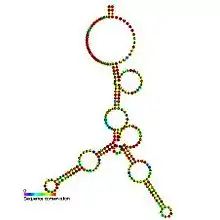Small Cajal body specific RNA 6
Small Cajal body specific RNA 6 (also known as SCARNA6 or U88) is a small nucleolar RNA found in Cajal bodies and believed to be involved in the pseudouridylation (isomerisation of uridine to pseudouridine) of U5 spliceosomal RNA.
| Small Cajal body specific RNA 6 | |
|---|---|
 Predicted secondary structure and sequence conservation of SCARNA6 | |
| Identifiers | |
| Symbol | SCARNA6 |
| Alt. Symbols | U88 |
| Rfam | RF00478 |
| Other data | |
| RNA type | Gene; snRNA; snoRNA; scaRNA |
| Domain(s) | Eukaryota |
| GO | GO:0006396 GO:0005730 |
| SO | SO:0000275 |
| PDB structures | PDBe |
scaRNAs are a specific class of small nucleolar RNAs that localise to the Cajal bodies and guide the modification of RNA polymerase II transcribed spliceosomal RNAs U1, U2, U4, U5 and U12[1]
U88 is found associated with both fibrillarin and Gar1p and co-localises with coilin in Cajal bodies.[1] It is an unusual guide RNA in that it is composed of both H/ACA box and a C/D box conserved domains. It is predicted to guide 2'-O-methylation of residue U41 of the U5 snRNA.[1]
U88 is also closely related to other human snoRNAs scaRNA U87 and a mouse homologue MBI-46.[2] In the human genome both U88 and U87 scaRNAs share the same host gene.[1][3]
References
- Darzacq X, Jády BE, Verheggen C, Kiss AM, Bertrand E, Kiss T (June 2002). "Cajal body-specific small nuclear RNAs: a novel class of 2'-O-methylation and pseudouridylation guide RNAs". The EMBO Journal. 21 (11): 2746–56. doi:10.1093/emboj/21.11.2746. PMC 126017. PMID 12032087.
- Hüttenhofer A, Kiefmann M, Meier-Ewert S, O'Brien J, Lehrach H, Bachellerie JP, Brosius J (June 2001). "RNomics: an experimental approach that identifies 201 candidates for novel, small, non-messenger RNAs in mouse". The EMBO Journal. 20 (11): 2943–53. doi:10.1093/emboj/20.11.2943. PMC 125495. PMID 11387227.
- Lestrade L, Weber MJ (January 2006). "snoRNA-LBME-db, a comprehensive database of human H/ACA and C/D box snoRNAs". Nucleic Acids Research. 34 (Database issue): D158-62. CiteSeerX 10.1.1.105.7552. doi:10.1093/nar/gkj002. PMC 1347365. PMID 16381836.